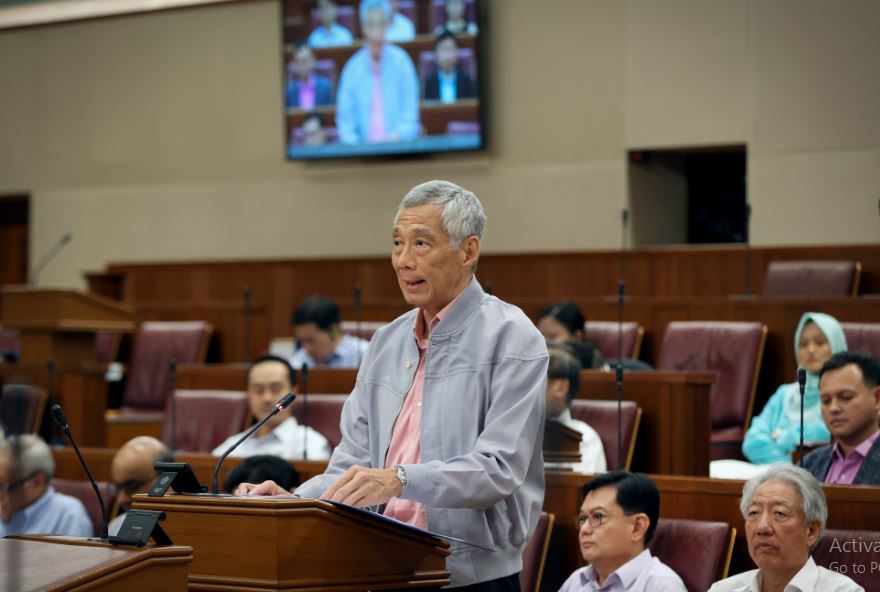Singapore: The deep mutual suspicion and fundamental distrust between the United States and China will not improve anytime soon and it will mean “big trouble” for the rest of the world, Singapore Prime Minister Lee Hsien Loong said Wednesday.
Lee, who made an official visit to Beijing earlier this month, said that the Chinese public perception of the US has deteriorated. China’s leaders are convinced that the US is seeking to “contain, encircle and suppress” China, Lee said, quoting Chinese President Xi Jinping.
“Even if the two powers avoid a direct conflict… Enduring enmity and bad relations between them will be very costly for both and will mean big trouble for the rest of the world,” Lee said in Parliament, outlining three major geopolitical tensions that make the current global situation graver than what Singapore has faced in a long time.
Singaporeans need to realise the gravity of the situation, he said. “We are facing not just one storm, but several,” Lee said, updating Singaporeans on the global situation.
While Democrats and Republicans in the US disagree on almost everything, they are united on China. The prevailing view is that efforts to work out a cooperative relationship with Beijing have failed and its growing strength and assertiveness are becoming a grave threat to US interests and values.
Therefore, their view is that the US must go for “extreme competition” with China over technology, including semiconductor chips, quantum technology, artificial intelligence, biotechnology and green technologies, Lee was quoted as saying by The Straits Times newspaper.
Negative perceptions of China are prevalent among the US population too, Lee said, citing the latest survey by the Pew Research Centre, which found that over 80 per cent of adults in the US have an unfavourable view of China, while nearly 40 per cent would describe China as an enemy of the US rather than as a competitor or partner.
“(The Chinese) say the East is rising, and the West is declining, and they think the time has come for China to take its rightful place in the world,” he said.
Lee added that they consider issues like Hong Kong, Xinjiang and Tibet to be China’s domestic matters that affect its security and integrity and see no room for discussion or compromise on these issues.
“But the most dangerous flashpoint of all is Taiwan,” noted Lee, adding that Singapore rigorously upholds its “One China” policy and continues to support the peaceful development of cross-strait relations.
“China considers Taiwan as the most important issue, and the ‘One China’ principle to be the reddest of its red lines. But the Western alternative narrative is gaining currency,” Lee said.
He said that the problem in cross-strait relations is a broader ideological issue of democracy versus autocracy, noting it is so even though most countries, including Western countries, have adopted the “One China” policies.
Tensions over Taiwan are high, Lee said, noting how China recently launched three days of extensive military exercises around Taiwan after President Tsai Ing-wen met US House Speaker Kevin McCarthy during her stopover in the US.
A media report described the exercises as “comprehensive and precise simulated attacks on the key targets in the island and surrounding waters”.
Lee expressed hope that relations between the US and China do not get worse and that both sides continue to keep lines of communication open, gradually repairing their relationship based on mutual respect and trust.
Another geopolitical storm Singapore faces is the war in Ukraine which is deadlocked after over a year, with no good outcome in sight.
“Neither side can win, nor can either afford to lose,” said Lee.
While the Ukrainians are reluctant to stop fighting before they reclaim all of their territories, the Russians are unlikely to be defeated entirely, despite heavy losses, since they have a large population and can still conscript more troops and mobilise more resources.
There is also a risk of the war escalating as the US and NATO countries continue supplying Ukraine with sophisticated military equipment, Lee said.
“If the Ukrainians, using these Western-supplied weapons, make a breakthrough on the battlefield, we cannot predict how Russia may react,” he said, adding the war, thus, may continue to disrupt global energy, food and fertiliser supplies, causing prices to rise.
Asserting that the war also has significant implications on international relations, Lee described the relations between Russia and the NATO countries as “completely broken down and will not return to normal anytime soon”.
Two months ago, Russia suspended its participation in the New Start treaty, its only remaining nuclear arms control treaty with the US.
The third big issue Singapore faces is a global multilateral trading system under siege. Countries are prioritising domestic and national security considerations, and no longer talk about trade being win-win, Lee said.
This has serious implications for small, open economies, such as Singapore that cannot survive other than as an open economy, which relies on trade and investments and a common set of rules that applies to all countries, Lee said.
“We are once again heading towards a world where protectionism is the default and trade rules are secondary, like what happened in the period between the First and Second world wars,” he said.
He noted that the Washington-based International Monetary Fund recently estimated that fragmentation of the global economy could, in the long run, reduce global gross domestic product by 7 per cent, and said the reality is probably worse.
“A deep decoupling of the world economy would undo what has taken countries decades to collectively achieve,” he said.
PTI
